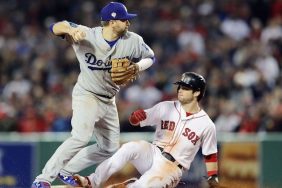Two years ago, Justin Verlander was on top of the pitching world. His 2011 campaign yielded 24 wins and the first Cy Young/MVP combo in 20 seasons and he nearly matched that performance in 2012. 2013 has seen an entirely different Verlander, in more ways than one.
After several seasons in which he was widely considered the best pitcher in baseball (sorry Felix Hernandez and Clayton Kershaw), the Tigers hurler has been only the third-best pitcher on his own team in 2013; both Anibal Sanchez (2.68) and Max Scherzer (3.01) have outpaced Verlander’s 3.99 ERA.
How much better was Verlander in the last two years than he has been this season? His ERA in 2011-12 was a combined 2.52, nearly 1.5 runs lower than in 2013. Similarly, his WHIP of 1.41 this season is much higher than his combined figure of 0.99 the previous two years.
It is hard to determine whether the right-hander is simply experiencing a down season or whether this is the new normal for a once-great pitcher. Right now, the numbers say it is a little of both.
The spike in Verlander’s ERA and WHIP can be attributed partly to relative ineffectiveness and partly to bad luck.
He has had a dominant fastball throughout his career, and his average velocity on that pitch in 2012 combined was 94.7 mph, good for third in all of baseball. This year, however, his average fastball velocity has dipped to less than 93 mph and opponents have had much more success against the pitch than in previous seasons.
The drop in velocity could be caused by Verlander’s advancing age. At 30 years old, he is at the stage of his career where most pitchers begin to lose speed. However, the suddenness and steepness of the decline points to the possibility of a hidden injury that he is pitching through. Look for a bounce-back season in 2014 if that is indeed the case.
Not all of Verlander’s struggles can be attributed to a drop in velocity though. He has had the misfortune of seeing batters hit .330 against him on balls in play this season. That is a marked increase from the .255 figure he posted in 2011-12. His career average is .288 in this category, so the truth may be that Verlander is a better pitcher than he has shown this year but not quite as good as he looked the last couple of seasons.
Taking all of these numbers into account, it seems that the “real” Verlander will likely be a second-tier pitcher for the rest of his career. It is unlikely he will ever return to the heights he reached in 2011 or 2012, but he can still be a solid No. 2 starter on a good team or an ace on a mediocre one.
I recommend sticking with him if you are in a keeper league unless you can get a Matt Harvey-level arm for him. It is also a good idea to resist the urge to deal him if you own him in a single-season league. He will likely have some good starts coming as his BABIP regresses to his career average and he gets healthier.
Dylan Sinn is a freelance contributor for CraveOnline Sports. You can follow him on Twitter @DylanSinn or subscribe at Facebook.com/CraveOnlineSports.
Photo Credit: Getty







